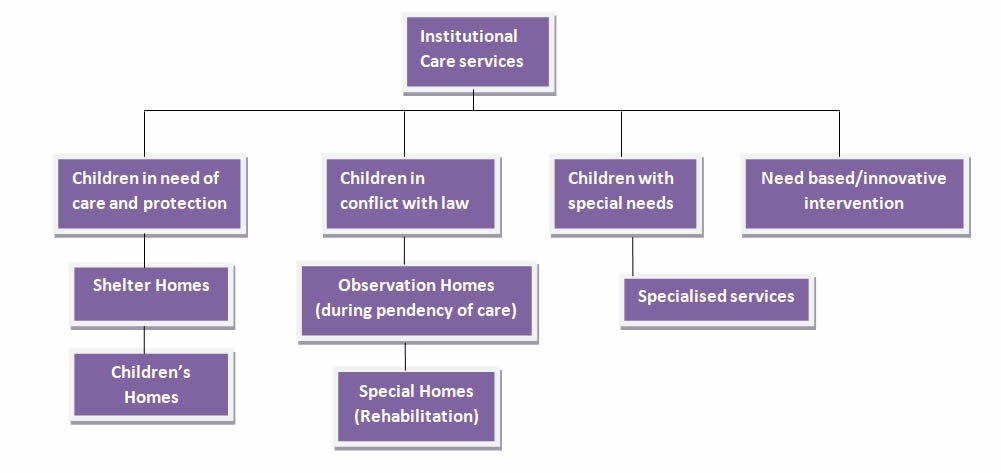- Agriculture & Farmers Empowerment
- Police
- Health & Family Welfare
- Education
- Women, Child Developement and Mission Shakti
- Social Security & Empowerment of Persons with Disabilities
- Rural Water Supply & Sanitation
- District Child Protection Unit
- Forest & Environment
- District Employment Exchange
- District Information and Public Relations Office
- Labour & ESI
- District Rural Development Agency
- District Welfare Office
Programmes under Child Protection Services (Umbrella ICDS), Department of Women & Child Development and Mission Shakti, Odisha.
NON INSTITUTIONAL SERVICES
SPONSORSHIP
Sponsorship is a conditional financial support rendered to the children staying in a recognized/unrecognized child care institution and can be restored to their families or extended families and the children who are rescued from difficult circumstances (e.g child labor, sexual abuse, victim of trafficking) with their families to prevent further exploitation may be awarded sponsorship and the children of families living in extreme conditions of deprivation or exploitation to enable the child to remain in his/her family.
Financial Provision
- Rs. 2000 per child per month for maximum 2 children per family subject to revision in norms from time to time.
- Duration – Maximum up to “Three” years or up to 18 years, whichever is earlier other than exceptional circumstances. The term of the sponsorship will be decided by the Sponsorship and Foster Care Approval Committee (SFCAC).
Role of District Child Protection Unit
- All application will be routed through District Child Protection Unit to avail sponsorship.
- Different documentation such as Individual Care Plan (ICP), Home Study Report (HSR) and Counselling records will be ensured.
- Facilitating to enroll in anganwadi/school for education of the child.
- Assist to open a Bank Account for online money transfer.
- Conduct follow-up to ensure effective mainstreaming.
Role Sponsorship Foster Care Approval Committee (SFCAC)
- SFCAC has been formed in every district.
- The committee shall assess the sustainability of sponsorship through verifying the documents.
- It will recommend the tenure of sponsorship.
- Monitoring and review of sponsorship will be done by the committee too.
Child Welfare Committee
- Child Welfare Committee under JJ (C&PC) Act issues Order of Sponsorship Placement.
Condition for Termination of Sponsorship
- When the child achieves the 18 years of age.
- When the parent/family’s economic position has7 improved and parent/extended family does not require sponsorship for meeting the educational needs of their child/children.
- The child has stopped going to school/anganwadi (except in special instances of disability or illness of the child which shall be verified by the DCPU). At least 75% attendance in anganwadi centre/school is necessary.
- In case both parents suddenly become incapacitated or unfit to look after the child.
- Child has been institutionalised at CCI.
- It is found that sponsorship fund is being diverted and not being used for the overall development of the child.
- The child is continuously deliberately being neglected by the family/extended family.
ADOPTION
What is Adoption?
As per Sub-section 2 of Section 2 under Juvenile Justice (Care & Protection of Children) Act 2015, Adoption is the process through which the adopted child is permanently separated from his biological parents and becomes the lawful child of his adoptive parents with all the rights, privileges and responsibilities that are attached to a biological child.
Who can Adopt?
As per Section 57 of Juvenile Justice (Care & Protection of Children) Act 2015, the eligibility of prospective adoptive parents are as follows:-
- The prospective adoptive parents shall be physically fit, financially sound, mentally alert and highly motivated for providing a good upbringing to him.
- In case of a couple, the consent of both the spouses for the adoption shall be required.
- A single or divorced person can also adopt, subject to fulfilment of the criteria and in accordance with the provisions of adoption regulations framed by the Authority.
- A single male is not eligible to adopt a girl child.
Additional Eligibility Criteria:
- The prospective adoptive parents shall be physically, mentally and emotionally stable, financially capable and shall not have any life threatening medical condition..
- Any prospective adoptive parents, irrespective of his marital status and whether or not he has biological son or daughter, can adopt a child subject to following, namely:-. (a) the consent of both the spouses for the adoption shall be required, in case of a married couple; (b) a single female can adopt a child of any gender; (c) a single male shall not be eligible to adopt a girl child;
- No child shall be given in adoption to a couple unless they have at least two years of stable marital relationship.
- The age of prospective adoptive parents, as on the date of registration, shall be counted for deciding the eligibility and the eligibility of prospective adoptive parents to apply for children of different age groups shall be as follows:
- Upto 4 years, the Maximum composite age of prospective adoptive parents (couple) is 90 yrs and Maximum age of single prospective adoptive parent is 45 years.
- Above 4 and upto 8 years, the Maximum composite age of prospective adoptive parents (couple) is 100 years and Maximum age of single prospective adoptive parent is 50 years
- Above 8 and upto 18 years, the Maximum composite age of prospective adoptive parents (couple) is 110 years and Maximum age of single prospective adoptive parent is 55 yearsa
- In case of couple, the composite age of the prospective adoptive parents shall be counted.
- The minimum age difference between the child and either of the prospective adoptive parents shall not be less than twenty-five years.
- The age criteria for prospective adoptive parents shall not be applicable in case of relative adoptions and adoption by step-parent.
- Couples with three or more children shall not be considered for adoption except in case of special need children as defined in sub-regulation (21) of regulation 2, hard to place children as mentioned in regulation 50 and in case of relative adoption and adoption by step-parent.
Online Registration Process:
Instructions for online Parent Registration visit web site:www.cara.nic.in
- This registration is meant for Indian citizens residing in India.
- Please give your correct residential address and telephone no. with area code.
- You or your spouse must have a Permanent Account Number (PAN) card and you have to upload PAN card in portable document format (.pdf) – size should not exceed 512 KB.
- In case of single parent you need to upload only your photograph & in case of Couple/Family you need to upload entire family photograph. * Photograph should be in .jpg format (3.5 x 4.5 cm). – Size should not exceed 1 MB
- You must have an email account and mobile number.
- After successful registration, you will receive an online acknowledgement letter which will contain your registration and credential details.
- In case you misplace your online acknowledgement letter, then it can be regenerated using Forgot Password link available in Track Status page.
- Please upload the following documents:
- Photograph of person/s adopting a child (Post Card Size).
- Birth Certificate.
- Proof of Residence (Adhaar Card/Voter Card/ Driving License/ Passport/ Current Electricity Bill/ Telephone Bill.
- Proof of Income of last year (Salary Slip/ Income Certificate issued by Govt. Department/ Income Tax Return).
- In case you are married, please upload Marriage Certificate.
- In case you are divorcee, please upload copy of Divorce Decree.
- In case of death of your spouse, please upload Death Certificate of spouse.
- Certificate from a medical practitioner certifying that the PAPs(Prospective Adoptive Parents) do not suffer from any chronic, contagious or fatal disease and they are fit to adopt.
- In case of incomplete/wrong information, your application is liable to be treated as invalid.
- After registration, you should contact the adoption agency.
- All original documents will have to be produced for verification.
- Your eligibility for adoption will be decided by the adoption agency.
AFTER CARE
The Juvenile Justice Act provides for an After Care Program for children without family or other support who leave institutional care after they attain 18 years of age to sustain themselves during the transition from institutional to independent life. The objective of this after care program is to enable such children to adapt to the society and to encourage them to move away from an institution based life.
DCPU shall identify suitable voluntary organizations that will run such After Care Programs. These organisations shall formulate an after-care program for these children for a period of three years in accordance with the provision laid down under the Juvenile Justice (Care and Protection of Children) Act 2000 and its rules developed by central and state governments. Some of the key components may include:
- Community group housing on a temporary basis for groups of 6-8 young person’s;
- Encouragement to learn a vocation or gain employment and contribute towards the rent as well as the running of the home;
- Encouragement to gradually sustain themselves without state support and move out of he group home to stay in a place of their own after saving sufficient amount through their earnings;
- Provision for a peer counsellor to stay in regular contact with these groups to discuss their rehabilitation plans and provide creative outlets for channelizing their energy and to tide over the crisis periods in their lives;
- Providing stipend during the course of vocational training until the youth gets employment;
- Arranging loans for youths aspiring to set up entrepreneurial activities;
FOSTER CARE
Foster Care is an arrangement whereby a child lives with an extended or unrelated family on temporary basis. The aim is to reunite the child with his/her own family when the family circumstances improve and to prevent institutionalisation of children in difficult circumstances. The target group of children who are not legally free for adoption, and whose parents are unable to care of them due to illness, death, desertion by one parents or any other crisis. The Child Welfare Committee, Koraput is the approving authority to issue order for Foster Care support. Sponsorship and Foster Care Approval Committee shall be constituted in each district to implement and monitor sponsorship and Foster Care Programme.
INSTITUTIONAL SERVICES
The Institutional Care is Children in Need of Care and Protection (CNCP) and Juvenile in Conflict with Law shall be provided short term and long term institutional services as per the requirements under JJ(CPC) Act and Rule. The Institutional Services shall cater to various needs of such children such as place of safety, food, cloth, health care, other basic services, education, life skill, vocational training and also work for family restoration and rehabilitation.
The ICPS scheme has provisions to support the creation of new institutional facilities and maintenance of existing institutional facilities for both categories of children. The various provisions for institutional care available under ICPS can be categorised in to,

The child in Conflict with Law shall be produced before the Juvenile Justice Board (JJB) and the Child in Need of Care and Protection shall be produced before the Child Welfare Committee (CWC) of the district.
The institutionalisation of children is considered as the last resort for the child. Child Protection Services has visualised alternative care for children in the following order of preference:
First Step: Preserving the biological family
Second Step: Kinship care
Third Step: In country adoption
Forth Step: Foster Care
Fifth Step: Inter country adoption
Six Step: Institutional Care
The CWC is the statutory bodies that are authorised to refer a child to any institutional care set up.
STATUTORY BODY
Child Welfare Committee
In accordance with the provisions under section-27 of the Juvenile Justice (Care & Protection of Children) Act, 2015 and read with rule-15 of the Juvenile Justice (Care & Protection of Children) Model Rules, 2016, the State Government constitutes Child Welfare Committees in districts time to time, for exercising the powers & to discharge duties, conferred on such committees in relation to Children in Need of Care & Protection under this Act and Rule.
As per section-29 of the Juvenile Justice (Care & Protection of Children) Act 2015, the Committee shall have the authority to dispose of cases for the care, protection, treatment, development and rehabilitation of the children in need of care and protection, as well as to provide for their basic needs and protection. Where a Committee has been constituted for any area, such Committee shall, notwithstanding anything contained in any other law for the time being in force but save as otherwise expressly provided in this Act, have the power to deal exclusively with all proceedings under this Act relating to children in need of care and protection.
As per Section 30 of the Juvenile Justice (Care & Protection of Children) Act, the committee shall perform the following functions, namely:-
- taking cognizance of and receiving the children produced before it;
- conducting inquiry on all issues relating to and affecting the safety and well being of the children under this Act;
- directing the Child Welfare Officers or probation officers or District Child Protection Unit or non-governmental organisations to conduct social investigation and submit a report before the Committee;
- conducting inquiry for declaring fit persons for care of children in need of care and protection;
- directing placement of a child in foster care;
- ensuring care, protection, appropriate rehabilitation or restoration of children in need of care and protection, based on the child’s individual care plan and passing necessary directions to parents or guardians or fit persons or children’s homes or fit facility in this regard;
- selecting registered institution for placement of each child requiring institutional support, based on the child’s age, gender, disability and needs and keeping in mind the available capacity of the institution;
- conducting at least two inspection visits per month of residential facilities for children in need of care and protection and recommending action for improvement in quality of services to the District Child Protection Unit and the State Government;
- certifying the execution of the surrender deed by the parents and ensuring that they are given time to reconsider their decision as well as making all efforts to keep the family together;
- ensuring that all efforts are made for restoration of abandoned or lost children to their families following due process, as may be prescribed;
- declaration of orphan, abandoned and surrendered child as legally free for adoption after due inquiry;
- taking suo motu cognizance of cases and reaching out to children in need of care and protection, who are not produced before the Committee, provided that such decision is taken by at least three members;
- taking action for rehabilitation of sexually abused children who are reported as children in need of care and protection to the Committee by Special Juvenile Police Unit or local police, as the case may be, under the Protection of Children from Sexual Offences Act, 2012;
- dealing with cases referred by the Board under sub-section (2) of section 17;
- co-ordinate with the police, labour department and other agencies involved in the care and protection of children with support of the District Child Protection Unit or the State Government;
- in case of a complaint of abuse of a child in any child care institution, the Committee shall conduct an inquiry and give directions to the police or the District Child Protection Unit or labour department or childline services, as the case may be;
- accessing appropriate legal services for children;
- such other functions and responsibilities, as may be prescribed
Juvenile Justice Board
In pursuance of Section-4 of the Juvenile Justice (Care and Protection of Children) Act, 2015 read with rule-3 of the Juvenile Justice (Care & Protection of Children) Model Rules, 2016, the State Government constitutes Juvenile Justice Boards in the districts time to time, for exercising the powers & to discharge duties, conferred on such Boards in relation to Children in Conflict with Law under this Act and Rule.
As per section-8 of the Juvenile Justice (Care & Protection of Children) Act, the Board shall, notwithstanding anything contained in any other law for the time being in force but save as otherwise expressly provided in this Act, have power to deal exclusively with all proceedings under this Act, relating to children in conflict with law. The powers conferred on the Board by or under this Act may also be exercised by the High Court and the Children’s Court, when the proceedings comes before them in appeal, revision or otherwise.
As per Sub-section 3 of Section-8 of the Juvenile Justice (Care & Protection of Children) Act, the Board shall perform the following functions, namely:-
- ensuring the informed participation of the child and the parent or guardian, in every step of the process;
- ensuring that the child’s rights are protected throughout the process of apprehending the child, inquiry, aftercare and rehabilitation;
- ensuring availability of legal aid for the child through the legal services institutions;
- directing the Probation Officer, or in case a Probation Officer is not available to the Child Welfare Officer or a social worker, to undertake a social investigation into the case and submit a social investigation report within a period of fifteen days from the date of first production before the Board to ascertain the circumstances in which the alleged offence was committed;
- adjudicate and dispose of cases of children in conflict with law in accordance with the process of inquiry specified in section 14;
- transferring to the Committee, matters concerning the child alleged to be in conflict with law, stated to be in need of care and protection at any stage, thereby recognising that a child in conflict with law can also be a child in need of care simultaneously and there is a need for the Committee and the Board to be both involved;
- disposing of the matter and passing a final order that includes an individual care plan for the child’s rehabilitation, including follow up by the Probation Officer or the District Child Protection Unit or a member of a non-governmental organisation, as may be required;
- conducting inquiry for declaring fit persons regarding care of children in conflict with law;
- conducting at least one inspection visit every month of residential facilities for children in conflict with law and recommend action for improvement in quality of services to the District Child Protection Unit and the State Government;
- order the police for registration of first information report for offences committed against any child in conflict with law, under this Act or any other law for the time being in force, on a complaint made in this regard;
- order the police for registration of first information report for offences committed against any child in need of care and protection, under this Act or any other law for the time being in force, on a written complaint by a Committee in this regard;
- conducting regular inspection of jails meant for adults to check if any child is lodged in such jails and take immediate measures for transfer of such a child to the observation home; and
- Any other function as may be prescribed.
Special Juvenile Police Units(SJPU)
In accordance with Section 107 of the Juvenile Justice (Care and Protection of Children) Act, 2015 and Rule of the Juvenile Justice (Care & Protection of Children) Model Rules, 2016, a Special Juvenile Police Unit has been created in each district vide Home Department notification no. 37757 HRPC (A) 4/2012 dated 24.09.2012, with the following composition:-
- Deputy Superintendent of Police, HRPC of the District/ACP, …..Chairman
- Child Welfare Police Officers of all police stations coming within the jurisdiction of the district …..Members
- Two Social Workers who are attached to the District Child Protection Unit (DCPU) of the concerned district …..Members








